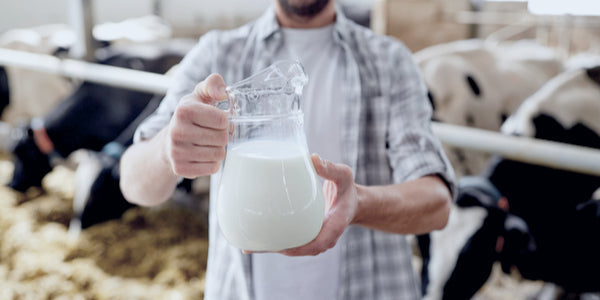
As children, parents and teachers frequently encourage the consumption of milk to promote growth and build strong bones. It is true that the calcium among other vitamins and minerals in dairy products do accomplish this.
But, is consuming dairy the only way to consume the nutrients that help keep children vitally growing?
In short, no.
While dairy has always remained a necessary part of the food pyramid and government guidelines, the farming practices have not remained the same. Related to the need for more, more, more, the dairy industry altered its methods to serve the masses.
As a result, the nutritional quality of some dairy products diminished and the negative effects of dairy on the body are recognized. Such negative effects of dairy within the body impact digestion greatest.
But how exactly might dairy, that nutrient known to support bone health and growth, impact the digestive system? Find out the truth about dairy and digestion here!
How Does the Body Digest Dairy
Dairy is an interesting food group in that it includes protein, carbohydrate, and fat (if not skim). These three macronutrients are digested via different pathways and mechanisms in the body.
Dairy and digestion do not always mix well as evidenced by the amount of people who are lactose intolerant. People who are lactose intolerant lack the enzyme called lactase.
Without lactase to digest the lactose sugar, the sugar enters the colon unprocessed/undigested leading to fermentation. Fermentation, then, produces gas which can cause common symptoms of lactose intolerance such as:
• Bloating
• Cramping
• Diarrhea
• Constipation
Now, some studies show the inability to digest dairy can lead to other undesirable consequences. These include cystic acne, some mood disorders, amongst the others.
Dairy Effects on Overall Health
The effects of dairy on overall health largely depend on the presence or lack of the enzyme lactase.
Children and adults who retain lactase throughout their lifetime can consume dairy with ease. However, those without it will most likely suffer some of the unpleasant symptoms mentioned above among other health consequences.
Yet, just because one can eat dairy, should they? Take a look at some of the pros and cons!
Pros:
• Contains healthy proteins, fatty acids, and natural sugar
• Provides almost 30 percent of the day's calcium recommendation in just one cup
• Offers other vitamins and minerals like vitamin D, riboflavin, vitamin B12, potassium, phosphorous, vitamin A, and more
• Associated with a decrease in cardiovascular disease and osteoporosis
• Tends to taste pretty delicious
Cons:
• Full-fat dairy like cheese, butter, and cream is high in saturated fat and calories
• Eating large amounts may lead to weight gain, high cholesterol, and other metabolic concerns
• May cause constipation
• Cow's milk and other dairy may contain natural and often chemical hormones or derivatives
In summary, if someone can digest dairy, eating appropriate portions in moderation will probably pose little health risk and may even benefit overall health.
However, those without the lactase enzyme or those sensitive to artificial hormones and additives will likely not benefit from dairy consumption. What’s more, they may even suffer as a result.
How the Dairy Industry Has Contributed to Digestive Health Issues
The major ways the dairy industry has contributed to digestive health issues reside within the current farming practices. Dairy can be farmed conventionally or organically but practices within both of those can differ as well.
Organic farming involves raising cows who are only fed organic feed and receive at least 120 days of pasture grazing per year. Cows might be fed grasses and hay, as well as grain and other feed that is organically produced.
Within the dairy industry, most nutritious dairy comes from animals that spend ample time on fresh pasture eating plenty of grass. The grass is also complemented with hay, root veggies, and, sometimes, grains without hormones or antibiotics.
Conversely, in conventional dairy farming, animals are often raised on confined farms. In addition, sewage sludge, irradiation, antibiotics, growth hormones, and pesticides are legal and frequently utilized. This can wreak havoc on the environment, the animal's body, and the human body.
Additionally, the small, idyllic farms of yesterday have been replaced with large scale, mechanistic, and artificial versions. Although this contributes to more production, the health of animals and humans suffer.
How the Above Farming Practices Affect Digestive Health on a Cellular Level
• Added pesticides have been shown to disrupt the gut microbiota
• Increased use of antibiotics leads to more antibiotic-resistant bacteria in animals and the humans that consume them
• Cows given added hormones and unnecessary antibiotics may impair the gut lining of humans
• Milk from rBGH-treated cows has higher levels of IGF-1, a hormone that normally helps some types of cells to grow. Early studies have shown development of cancer, including breast, colorectal, and prostate cancers, with blood levels of IGF-1.*
*The American Cancer Society notes it is not clear if drinking milk produced with rBGH significantly increases IGF-1 levels in humans or increases the risk of developing cancer.
Conclusion
Due to altered farming practices, the nutritional quality of dairy has diminished, largely related to added pesticides, hormones, and unnecessary antibiotics. And, undeniably, this has affected human digestion of dairy.
So, dairy can be consumed without noticeable adverse symptoms for many folks who still have the lactase enzyme. However, it can still affect the integrity of the human gut and may also impact humans hormonally.
Even so, choosing to eat dairy or not is individualized and should factor in many considerations!
References:
The American Cancer Society medical and editorial content team. Recombinant Bovine Growth Hormone. American Cancer Society. www.cancer.org/cancer/cancer-causes/recombinant-bovine-growth-hormone.html.
Andrews, Ryan, and Brian St. Pierre. Dairy: Is It Good or Bad for You? Exploring the Pros and Cons of This Controversial Food Group. Precision Nutrition. www.precisionnutrition.com/is-dairy-good-or-bad-for-you.
Defois, C., Ratel, J., Garrait, G. et al. Food Chemicals Disrupt Human Gut Microbiota Activity And Impact Intestinal Homeostasis As Revealed By In Vitro Systems. Sci Rep 8, 11006 (2018). https://doi.org/10.1038/s41598-018-29376-9.
Northwestern Medicine. Dairy: Do You Really Need It? Northwestern Medicine. www.nm.org/healthbeat/healthy-tips/nutrition/dairy-do-you-really-need-it.
Winslow, Amelia. 10 Ways Organic Dairy Is Different from Conventional. Eating Made Easy, 12 Dec. 2016, eating-made-easy.com/10-ways-organic-dairy-is-different-from-conventional/.







